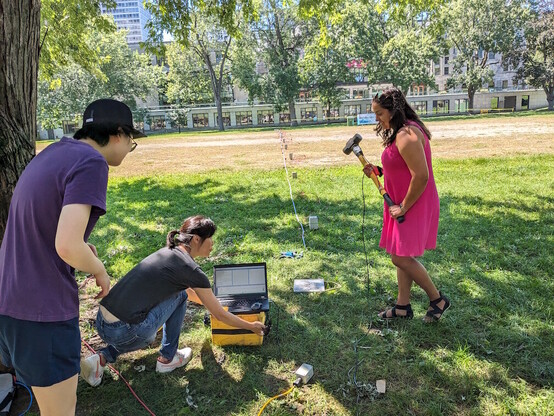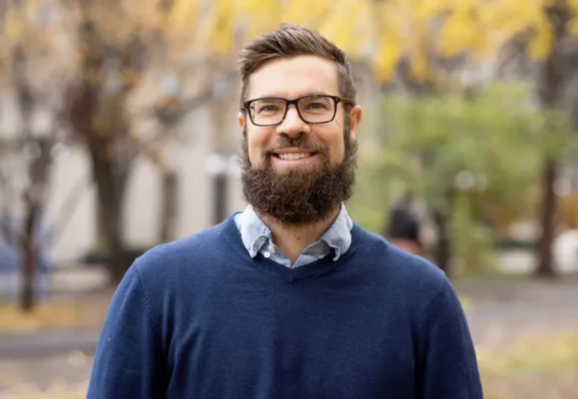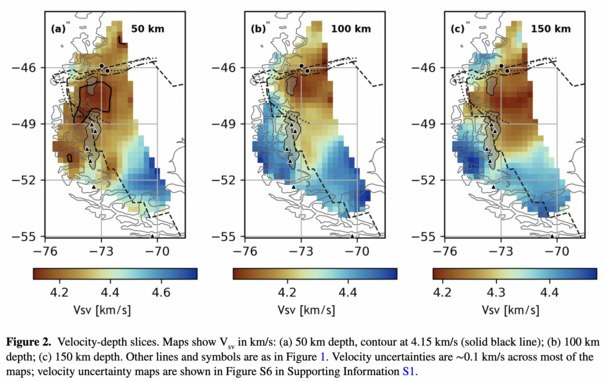Typographica · @typographica
2907 followers · 1093 posts · Server typo.socialA love letter to Canada: Specimen of printing types and ornaments in use at the Printing Office of Lovell & Gibson, St. Nicholas Street, Montreal, 1846/47 (courtesy @mcgillu): https://catalog.hathitrust.org/Record/102870285. The latest addition to the Typographica Library https://library.typographica.org/specimen-books-of-metal-wood-type.
#TypeSpecimen #Typography #Canada #Montreal #McGillUniversity #Letterpress #1800s #19thCentury
#TypeSpecimen #typography #canada #montreal #mcgilluniversity #letterpress #1800s #19thcentury
Bill Minarik · @silicatefondue
218 followers · 728 posts · Server fosstodon.orgBlog post by Erin Gibbons explaining the importance of the #Perseverance rover's approach to locations identified as carbonate-rich from instruments in orbit above Mars.
#Mars2020 #McGillUniversity #MinCup23 #calcite #siderite #magnesite
#perseverance #mars2020 #mcgilluniversity #mincup23 #calcite #siderite #magnesite
SciPost Physics · @physics
652 followers · 338 posts · Server scipost.socialNew #openaccess publication #SciPost #Physics
Near-extremal limits of warped black holes
Ankit Aggarwal, Alejandra Castro, Stéphane Detournay, Beatrix Mühlmann
SciPost Phys. 15, 083 (2023)
https://scipost.org/SciPostPhys.15.3.083
#UvA
#ULB
#UniversityofCambridge
#McGillUniversity
#FNRS
#NSERC_CRSNG
#NWO
#STFC
#SimonsFoundation
#Solvay
#openaccess #SciPost #physics #uva #ULB #universityofcambridge #mcgilluniversity #FNRS #NSERC_CRSNG #NWO #STFC #SimonsFoundation #Solvay
Bill Minarik · @silicatefondue
202 followers · 516 posts · Server fosstodon.orgIt's new student orientation! Fine weather yesterday for our hammer-source geophone array demonstration. Every swing of the sledgehammer improves the image of depth-to-bedrock, and potentially even shows the top of the REM tunnel under Mont Royal!
#McGillUniversity #Seismology #EarthScience #Montreal
#mcgilluniversity #seismology #earthscience #montreal
Bill Minarik · @silicatefondue
196 followers · 496 posts · Server fosstodon.orgWe are hiring a Research Associate in the Earth and Planetary Sciences Department, #McGillUniversity #Montreal #Geology #EarthScience
This person will assist faculty and graduate students with planning and executing field-based research, improving our rock preparation facilities, and assist with the curation and storage of rock samples. See:
https://mcgill.wd3.myworkdayjobs.com/en-US/mcgill_careers/job/Research-Assistant-2_JR0000044305
#mcgilluniversity #montreal #geology #earthscience
SciPost Physics · @physics
612 followers · 301 posts · Server scipost.socialNew #openaccess publication #SciPost #Physics
Near-extremal limits of warped CFTs
Ankit Aggarwal, Alejandra Castro, Stéphane Detournay, Beatrix Mühlmann
SciPost Phys. 15, 056 (2023)
https://scipost.org/SciPostPhys.15.2.056
#UvA
#ULB
#DeltaITP
#UniversityofCambridge
#McGillUniversity
#FNRS
#NSERC/CRSNG
#NWO
#STFC
#SimonsFoundation
#openaccess #SciPost #physics #uva #ULB #DeltaITP #universityofcambridge #mcgilluniversity #FNRS #NSERC #NWO #STFC #SimonsFoundation
SciPost Physics · @physics
596 followers · 275 posts · Server scipost.socialNew #openaccess publication #SciPost #Physics
Late-time correlators and complex geodesics in de Sitter space
Lars Aalsma, Mir Mehedi Faruk, Jan Pieter van der Schaar, Manus Visser, Job de Witte
SciPost Phys. 15, 031 (2023)
https://scipost.org/SciPostPhys.15.1.031
#ASU
#IoP-UvA
#McGillUniversity
#DeltaITP
#UniversityofCambridge
#Heising-SimonsFoundation
#OCW
#NWO
#SNF
#openaccess #SciPost #physics #asu #IoP #mcgilluniversity #DeltaITP #universityofcambridge #Heising #OCW #NWO #SNF
Bill Minarik · @silicatefondue
182 followers · 429 posts · Server fosstodon.orgNicolas Cowan, Associate Professor in the departments of Physics and Earth and Planetary Sciences, has been appointed co-Principal Investigator of the Ariel mission, and up to 12 other Canadian astronomers will gain privileged access to Ariel’s data.
#Ariel #McGillUniversity #Astronomy #Exoplanet #ESA
#ariel #mcgilluniversity #astronomy #exoplanet #esa
Bill Minarik · @silicatefondue
165 followers · 398 posts · Server fosstodon.org#UtrechtUniversity #EarthSystemScience #Geology
One more Friday early-career presenter at the #Goldschmidt2023 conference #Lyon:
*Alissa J Kotowski* (Utrecht University)
Low-temperature plate boundary serpentinization post-dates subduction initiation and facilitates obduction of an Appalachian ophiolite
Session 4fO2 09:30 CEST
Field work at Mont Albert, Gaspé Peninsula, #Quebec done while at #McGillUniversity. #Ordovician #TaconicOrogeny
#utrechtuniversity #earthsystemscience #geology #goldschmidt2023 #lyon #quebec #mcgilluniversity #Ordovician #taconicorogeny
Bill Minarik · @silicatefondue
165 followers · 397 posts · Server fosstodon.org#McGillUniversity #EarthSystemScience #Geology
Friday's early-career presenters at the #Goldschmidt2023 conference #Lyon:
*Matthew Tarling*
Deciphering the combined structural and mineralogical record of serpentinite fault rocks
Session 4fO2 09:15 CEST
*Jillian Kendrick*
Field observations, petrography, geochemistry, and phase equilibrium modelling: The four pillars of petrological investigations of crustal differentiation
Session 4dO1 11:15 CEST
#mcgilluniversity #earthsystemscience #geology #goldschmidt2023 #lyon
Bill Minarik · @silicatefondue
165 followers · 391 posts · Server fosstodon.org#McGillUniversity #EarthSystemScience #Geology
Monday & Tuesday's early-career presenters at the #Goldschmidt2023 conference #Lyon (late notice):
*Kathryn Rico* now at Arizona State U
Combining trace metal geochemistry and experimental microbiology to explore the role of dissimilatory Fe(III) reducing bacteria in precursor Banded Iron Formations
*Maxwell Lechwe*
Palaeoredox and environmental constraints on early eukaryote ecosystems: insights from the Greater McArthur Basin, northern Australia
#mcgilluniversity #earthsystemscience #geology #goldschmidt2023 #lyon
Bill Minarik · @silicatefondue
147 followers · 367 posts · Server fosstodon.orgExcellent talk last week by Hannah Mark, now at Woods Hole on documenting thin lithosphere and low viscosities essential to model ice distribution over time in the southern Andes. Figure shows seismic velocities, with red corresponding to slow (hot) mantle. More info: https://essopenarchive.org/doi/full/10.1002/essoar.10510075.1
#McGillUniversity #WHOI #EarthSystemScience #Seismology #Lithosphere
#mcgilluniversity #WHOI #earthsystemscience #seismology #lithosphere
Bill Minarik · @silicatefondue
125 followers · 264 posts · Server fosstodon.orgThe ground we live on is the top of a moving rock area that is really hot. The ground we live on is broken up into little rocks. Sometimes the little rocks move on top of each other. This makes the rocks get really tall. Sometimes one goes under the other one. The under rock gets really hot and becomes the moving rock under the ground. The moving rock under us sometimes comes up through the ground making new hot rock. [J. G.]
#PlateTectonics #UpGoer5 #EarthSystemScience #McGillUniversity
#platetectonics #upgoer5 #earthsystemscience #mcgilluniversity
Bill Minarik · @silicatefondue
125 followers · 263 posts · Server fosstodon.orgUpon death, living things either break down as the surrounding air, in a way, quickly eats up what is left of them or, they get covered under ground when not broken down. As the ground layer above gets bigger and heavier, the remains are pressed into a different and thicker form of matter. It takes a lot of time for the ground layer to grow heavy enough to change the state of the matter in such a way. Those old remains can then be burnt for power.
[V. B.]
#FossilFuels #UpGoer5 #McGillUniversity
#fossilfuels #upgoer5 #mcgilluniversity
Bill Minarik · @silicatefondue
125 followers · 262 posts · Server fosstodon.orgThe really big ball that we live on is made of huge pieces of ground that move around. Sometimes they knock into each other, run away from each other, or slip side to side. If two of them get stuck, power builds up in the rock and lets go as they are set free. The ground shakes a lot, large cracks form, rocks might slip down, and houses fall. If that happens in the big water area, a very tall wave will move onto the land and run into it. [M. T.]
#Earthquake #UpGoer5 #McGillUniversity
#earthquake #upgoer5 #mcgilluniversity
Bill Minarik · @silicatefondue
125 followers · 261 posts · Server fosstodon.orgAnother group of #EarthSystemScience #UpGoer5 Change that happens quickly and continues to grow. The growing that happens begins to happen faster and faster than it did at the start. The number of people in the world is a good way to understand this. It grows faster and faster than it did before. [K. A.]
#ExponentialGrowth #McGillUniversity
#earthsystemscience #upgoer5 #exponentialGrowth #mcgilluniversity
Bill Minarik · @silicatefondue
125 followers · 257 posts · Server fosstodon.org#UpGoer5 As the number of people gets bigger in an area, the number of stuff that is able to back them up gets lower. The number of people found in a place, is controlled by what is going on around them; such as how much food, water and homes is found. But when the total of how much of these is found around them gets lower, the total number of people coming into this world gets less. They then reach a still state where the number of people
stops getting big. #CarryingCapacity #McGillUniversity
#upgoer5 #CarryingCapacity #mcgilluniversity
Bill Minarik · @silicatefondue
125 followers · 256 posts · Server fosstodon.orgMore #EarthSystemScience #UpGoer5
Trees can tell us is what the world was like in the past. The rings inside a tree can show us how much it grew each year. In wet years, the tree will grow a thick ring, and in dry years, it will grow a small ring. People can study tree rings to see how hot and cold the world has been and how it has changed over time. This is important because it helps us understand how the world is changing now and how it may change.
#Proxies #McGillUniversity #SimpleWords
#earthsystemscience #upgoer5 #proxies #mcgilluniversity #simplewords
Bill Minarik · @silicatefondue
124 followers · 255 posts · Server fosstodon.orgEkman spiral continued....
The deeper water does not feel the wind, but it does feel the water above moving. So the same thing happens again, except this time the water goes in a direction even further from that of the wind, and so on, turning as we go deeper. At each step, we lose a bit of force, so we have less and less as we go down.
[A. B.-K.]
[2/2]
#Ekman #UpGoer5 #McGillUniversity #SimpleWords #EarthSystemScience
#ekman #upgoer5 #mcgilluniversity #simplewords #earthsystemscience
Bill Minarik · @silicatefondue
124 followers · 255 posts · Server fosstodon.orgWhen there is wind over water, the water's direction is normal to that of the wind. Whether it goes left or right is decided by the side of the mother ball we are on. Since the mother ball turns, the water closest to the middle goes the fastest. So when wind carries water further away from the middle, the water keeps its force, and that's why it doesn't move in the same direction as the wind. Continued....
[A. B.-K.]
[1/2]
#Ekman #UpGoer5 #McGillUniversity #SimpleWords
#ekman #upgoer5 #mcgilluniversity #simplewords







